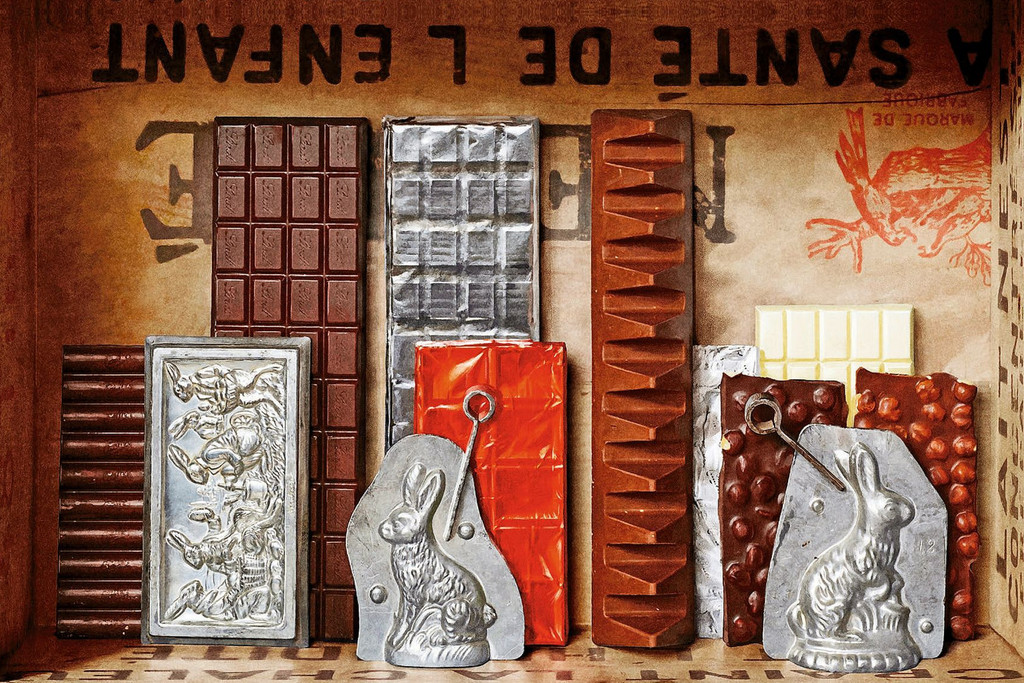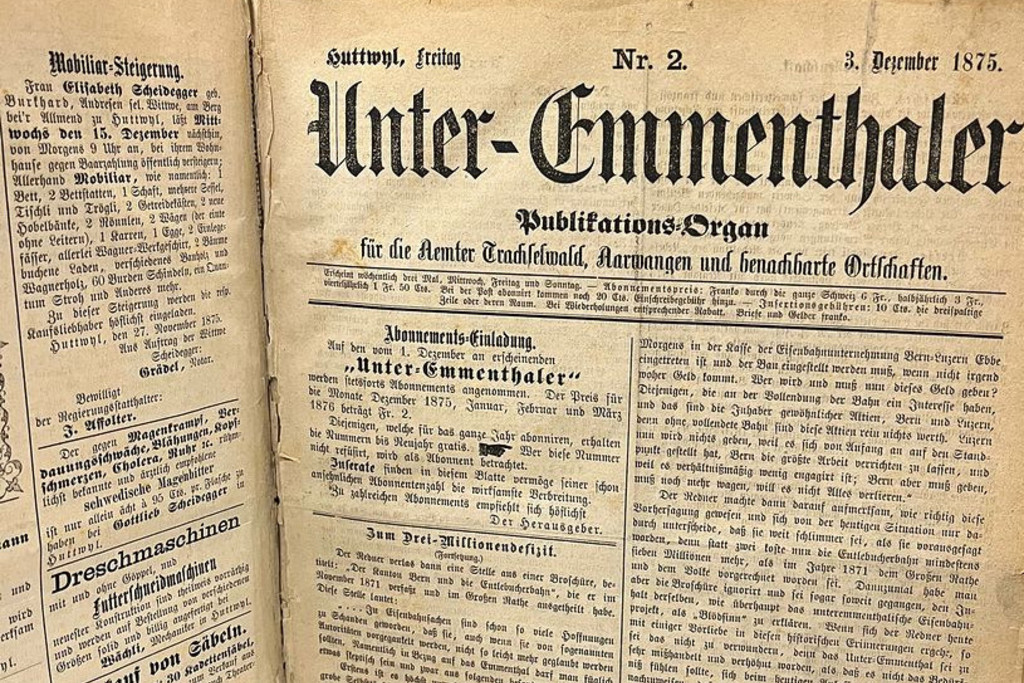Occasionally, this turns into a lifelong obsession for people who, for example, like to collect a particular coin from every year it was issued.
Legal tender since 1879
Lately, Swiss numismatics enthusiasts have been dealing in superlatives. According to the federal mint Swissmint, the ten-centime piece minted in 1879 is the “oldest unaltered coin still in circulation” – a fact authenticated by the publishers of the Guinness Book of World Records no less. The ten-centime coin, which depicts the head of Libertas, the Roman goddess of liberty, has remained unchanged for over 140 years. Even pieces minted in 1879 can still be used as legal tender.
Nevertheless, the emotional attachment that many Swiss have to the coins and banknotes of their national currency seems almost quaint these days, given that they are losing the habit of paying by cash.
Will cash soon be obsolete?
In its recent survey on payment methods, the Swiss National Bank (SNB) discovered that a watershed has been reached with regard to payment behaviour. In terms of the transaction value of non-recurring payments, the debit card has replaced cash in Switzerland as the most important payment instrument. Cash is now only the most widely used payment method for amounts up to 20 Swiss francs. Otherwise, the bulk of payments are settled by card.
According to the SNB, two factors have accelerated the trend towards cashless payments. Firstly, contactless payment is a technological development that has made paying by card even simpler than handing over cash at the till. Coins falling out of wallets and purses are a thing of the past. Secondly, the Covid-19 pandemic has seen many businesses actively urging their customers to make cashless payments. The general public has followed their advice and, according to the SNB survey, not looked back since.
“Banknote circulation has been increasing steadily for many years.”
Christoph Hirter
SNB spokesman
Will banknotes and coins become obsolete? Or could cash even be abolished for good and become the exclusive realm of enthusiastic collectors? For years, the former chief economist of the International Monetary Fund, Kenneth Rogoff, has been advocating what he calls a “less-cash society”. He believes that limiting the circulation of cash would not only allow governments to combat financial crimes such as tax evasion and the funding of terrorism and drug use more effectively, but it would also make it easier for them to enforce negative interest rates.
The cash comeback
However, Switzerland is seeing a different trend which illustrates the nation’s paradoxical love affair with physical money. Although the Swiss are using less cash, the amount of Swiss franc notes in circulation is rising. “Banknote circulation has been increasing steadily for many years,” says SNB spokesman Christoph Hirter. “People also generally tend to hoard more cash during crises.” As far as the Swiss franc is concerned, the cash curve has been climbing since around the time of the 2008 financial crisis and, according to Hirter, continued upwards in the Covid year of 2020.
The SNB keeps an exact account of how many banknotes of each denomination are in circulation. The corresponding value of these notes is currently 84.5 billion francs, of which over half consists of about 48 million 1,000-franc notes. If this money was shared equally, every Swiss man, woman and child would have 10,000 francs in cash, including six 1,000-franc banknotes. So, how come the majority of those questioned in the SNB survey said they kept less than 1,000 francs in cash?
Cash for freedom
“Your calculation fails to take account of the proportion of Swiss cash in circulation that is located abroad,” Hirter points out. There are undoubtedly psychological and ideological factors in play too. Take the Swiss Freedom Movement for example. The pressure group is currently collecting signatures for a popular initiative to preserve cash. The rise in cashless payments and the inevitable digital footprint that this creates provide greater scope for snooping and make it easier for the state to violate people’s privacy, laments the former SVP party secretary in Lucerne, Richard Koller, who chairs the group. “Cash is freedom, independence, and part of our culture,” he says. And too precious to give away.
Whether you share his view or not, cash in Switzerland is imbued with an aura and mystique that easily outstrips its nominal value. From the ten-centime coin to the 1,000-franc note.













Comments
Comments :
Vielfach ist zu beobachten, dass Kartenzahler an den Kassen viel mehr Zeit brauchen als Barzahler. Wer bar zahlt ist meistens auch besser über seine Finanzen orientiert, da Kartenzahler warten müßen bis sie den Kontostand sehen können...
jener Waehrung. Mutter war 93 und ich wollte Geld in der Schweiz behalten. Die SNB wird
mir das nun auf das Konto hier uebertragen aber zuerst muss es mir erlaubt sein in die Schweiz zu reisen mit Corona-Bestimmungen.
Je me retrouve avec un billet de CHF 100.00 périmé alors que je ne peux pas voyager en Suisse pour le moment.
Übrigens: Bargeld ist über den reinen Handelswert hinaus auch Geschichtsschreibung namens NUMISMATIK. Im Falle einer Verdigitalisierung würde auch dieses historisch wichtige Kulturzeugnis sein Ende finden.
Die Idee uns klar zu machen, dass Bargeld im Zeitalter der Digitalisierung überflüssig sei, dass es abzuschaffen sei, ist weiter nichts als noch so ein kommerzieller Wunschtraum der Digitalmäzenen im Dienste der totalen Beherrschungsabsicht von Bank und Staat.
Tatsächlich geht es darum, bei jeder Art Geldtransfer mitverdienen zu können und das ist bei Bargeld (noch) nicht möglich.
Bei der Abschaffung kleiner Münzen werden alle Preise "nur" um den Kleinbetrag steigen - die Summe macht's. Bitte, liebe Mitbürger, bringt daher die kleinen Münzen wieder in den Umlauf, statt sie zu sammeln und dann bei der Abgabe in den Banken happige Gebühren zu bezahlen (bis zu 50% der Summe). Und zahlt, wo immer möglich, mit Bargeld. (Ausnahme: Bankensponsoring ist eine Kernkompetenz dieser Person).
Tja. Daher habe ich Bargeld nur in USD.
Das Bezahlen mit Bargeld hat für mich einen Ritual-ähnlichen Charakter: Man gibt auch etwas als Gegenwert beim Kaufen.
Bargeld ist Freiheit und Unabhängigkeit...
Gerade jetzt habe ich das Mailing der "Schweizer Revue" bekommen. Danke, aber wer hat den Schildbürger Streich gemacht? Es ist der 15. Dezember 2021 und die Schweizer Noten sind April ungültig geworden! Wir konnten wegen dem Covid-Virus nicht reisen und haben immer einige Franken in Cash, weil wenn man in Zürich ankommt, hilft es Kleinigkeiten gleich bezahlen zu können bevor wir Geld umtauschen können. Ich habe nur Fr. 80.00, aber das war nicht nötig.Wir bekamen auch keine Nachricht vom Konsulat welche immer viel helfen.
Auch hier werden die Bedürfnisse der Auslandschweizer völlig ausgeblendet. Es wäre hilfreich, wenn unsere Nationalbank mit Bankinstituten anderer Staaten ein Abkommen zur Übernahme dieser aus dem Verkehr gezogenen Noten getroffen hätte. Viele Auslandschweizer haben zum Teil nicht unerhebliche Beträge im eigenen Tresor gehortet, da ihnen bekannterweise die Schweizerbanken die Konti aufgelöst haben. Denkbar auch andere Modelle für den Umtausch im jeweiligen Land. Es ist zum Teil nicht möglich, zum Teil unzumutbar, dass die Auslandschweizer mit ihrem Geld in die Schweiz reisen müssen.
Je suis content d'être retraité - j'aime la vie - cependant je ne procède jamais à des paiements par le biais d'une carte de compte. Je n'achète jamais sur internet. Aucune confiance avec tous ces Hacker et ses voleurs spécialistes de l'électronique. De plus, il s'agit d'un contrôle démesuré des autorités. Eh que dire des réseaux sociaux qui n'en sont pas en réalité. L'évolution de notre société informatisée est déplorable. Si un jour, les billets ne devaient plus exister.... il est mieux de quitter cette terre !
I have been reading the Swiss Review for decades, and for once I am dismayed with your article, or mainly the timing thereof. It is the first time I learn that SFr. banknotes can become illegal tender, and you write about it 9 months AFTER it happened. I am probably not the only person who has been gasping and rushing to her Swiss porte-monnaie to check on her reserve of CH banknotes. I always like to have a few of those for when I go back to my first home country, as they are generally handy, together with some coins. Luckily the ones I found in my purse are from the last series - phew! In the future, please inform us BEFORE such important things like money become invalid. Thank you.
Die Noten können zeitlich unbeschränkt am Schalter der SNB in Bern und Zürich sowie bei den SNB-Agenturen in Appenzell, Chur, Freiburg, Genf, Glarus, Liestal, Luzern, Sarnen, Schaffhausen, Schwyz, Sitten, Stans und Zug umgetauscht werden. .............. zeitlich unbeschränkt: being the key words
I found myself in the precarious position of having several hundred old Frank notes when I went to Switzerland in the fall… and found out about the new series when my cash was not accepted in a store. I admit it is a pain having to go to the SNB. At that time someone with a bank account could deposit them in an ATM and then withdraw new money…not sure if that still works now. But worth a try.
That does not help when arriving in Switzerland and wanting to use some cash to get from the airport to destination. Very disappointed that this is the first we hear about these notes becoming invalid, this should have been advised much earlier.
I can't believe Swiss Banknotes are no longer accepted! Ironically, in 1982 I was a college student studying in Europe (prior to the EU's formation). While my friend and I were on a train from Rome to Sicily, all Italian banks went on strike, so nobody would accept our credit cards or traveler's checks. .
After being turned away from several restaurants and hotels, I was delighted to discover a 50-Swiss franc note in my pocket, which was readily accepted by the hotel desk. It's sad that it would now be rejected, too.
There are new banknotes replacing the last series (as it happens regularly - I don’t know how many different ones I’ve seen in my lifetime…lots). And ALL old banknotes can be traded in at the Nationalbank for new, valid cash; so far they have not put a time limitation on that.